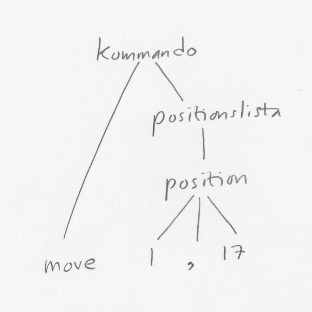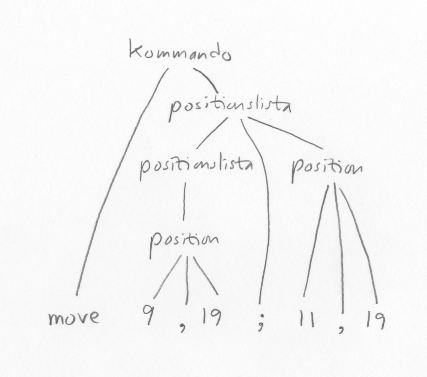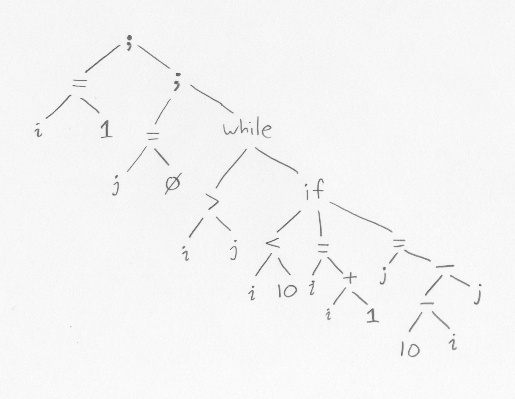
kommando -> move positionslistaIcke-terminaler: kommando positionslista position
positionslista -> positionslista ; position | position
position -> num , num
Parse-trädet för move 1, 17

Parse-trädet för move 9, 19; 11, 19

Den generella regeln för eliminering av vänsterrekursion säger att grammatiken
A -> A x | ykan skrivas om till A -> y R |
I det här fallet betyder det att produktionen
positionslista -> positionslista ; position | positionskrivs om till
positionslista -> position Rdär empty markerar en tom tokensträng.
R -> ; position R | empty
Därefter ser hela grammatiken alltså ut så här:
kommando -> move positionslistaJag antar att tokentyperna MOVE, HELTAL, KOMMA och SEMIKOLON finns definierade som heltalskonstanter. Spårutskrifterna, som skriver ut namnen på icke-terminaler, behöver inte heller vara med.
positionslista -> position R
R -> ; position R | empty
position -> num , num
int lookahead;
void error() {
printf("Ledsen error.\n");
exit(EXIT_FAILURE);
}
void match(int expected) {
if (lookahead != expected)
error();
else
lookahead = scan();
}
extern void kommando(), positionslista(), R(), position();
void kommando() {
printf("[kommando]\n");
match(MOVE);
positionslista();
}
void positionslista() {
printf("[positionslista]\n");
position();
R();
}
void R() {
printf("[R]\n");
if (lookahead == SEMIKOLON) {
match(SEMIKOLON);
position();
R();
}
else {
/* Match empty */
}
}
void position() {
printf("[position]\n");
match(HELTAL);
match(KOMMA);
match(HELTAL);
}
void parse() {
printf("[parse]\n");
lookahead = scan();
kommando();
printf("[Ok.]\n");
}
move [0-9]+ , [0-9]+ ( ; [0-9]+ , [0-9]+ )*
Om man tar hänsyn till var blanktecken får och ska förekomma:
move[ ]+[0-9]+[ ]*,[ ]*[0-9]+([ ]*;[ ]*[0-9]+[ ]*,[ ]*[0-9])*

b) Postfixkod för en stackmaskin:
lvalue i
push 1
=
lvalue j
push 0
=
label 0: rvalue i
rvalue j
>
gofalse 1
rvalue i
push 10
<
gofalse 2
lvalue i
rvalue i
push 1
+
=
goto 3
label 2: lvalue j
push 10
rvalue i
-
rvalue j
-
=
label 3: goto 0
label 1:
c) Treadresskod:
i = 1;
j = 0;
label 0: if (i ≤ j) goto 1;
if (i ≥ 10) goto 2;
i = i + 1;
goto 3;
label 2: t1 = 10 - i;
t2 = t1 - j;
j = t2;
label 3: goto 0
label 1:
Syntaktisk analys, som mynnar ut i ett syntaxträd, är ju en av faserna i kompileringen. Terminering, dvs att programmet avslutas och inte hänger sig i en oändlig loop, är något som händer vi exekveringen.
Switch-sats -> switch ( Expression ) { Branch-list }Ett annat alternativ, som kräver en default-gren och minst en vanlig gren:
Branch-list -> Optional-branches Optional-default-branch
Optional-branches -> Branches | empty
Optional-default-branch -> Default-branch | empty
Branches -> Branches Branch | Branch
Branch -> case Expression : Statement break ;
Default-branch -> default : Statement break ;
Switch-sats -> switch ( Expression ) { Branches Default-branch }
Branches -> Branches Branch | Branch
Branch -> case Expression : Statement break ;
Default-branch -> default : Statement break ;
void execute_switch(TreeNode* tree) {
if (tree->type != SWITCH)
error("Internt fel: Det där var ju ingen switch-sats!");
int switch_value = execute(tree->args[0]);
TreeNode* branches = tree->args[1];
while (branches != NULL) {
TreeNode* this_branch;
if (branches->type == SEMICOLON) {
this_branch = branches->args[0];
branches = branches->args[1];
}
else if (branches->type == CASE) {
this_branch = branches;
branches = NULL;
}
else if (branches->type == DEFAULT) {
this_branch = branches;
branches = NULL;
}
else
error("Internt fel: Omöjligt syntaxträd");
if (this_branch->type == CASE) {
if (switch_value == execute(this_branch->args[0])) {
execute(this_branch->args[1]);
return;
}
}
else if (this_branch->type == DEFAULT) {
execute(this_branch->args[0]);
return;
}
} /* while */
} /* execute_switch */